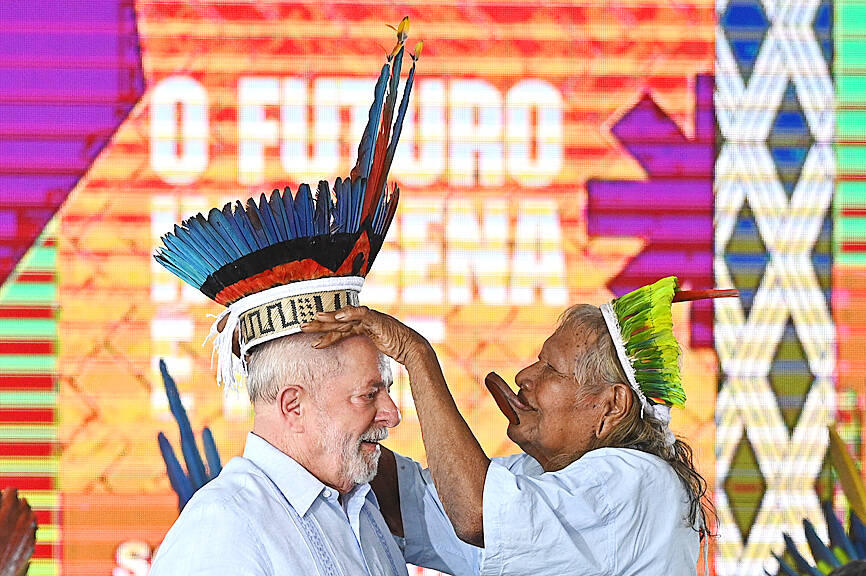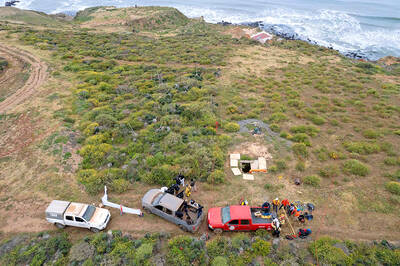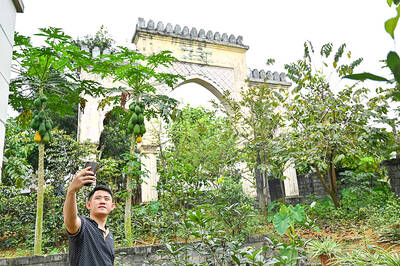Brazilian President Luiz Inacio Lula da Silva on Friday decreed six new indigenous reserves, including a vast Amazon territory, after a freeze in such expansion under former Brazilian president Jair Bolsonaro.
Under the decrees, indigenous people are guaranteed exclusive use of natural resources on these lands, viewed by scientists as a bulwark against Amazon deforestation — a major challenge in the fight against climate change. They also commit the Brazilian state to protecting reserve land from intrusions of timber traffickers or illegal miners — the main contributors to forest destruction.
Lula signed the official decrees covering 620,000 hectares of land on the final day of a gathering of indigenous people from around the country in the capital, Brasilia.

Photo: EPA-EFE
“It is a time-consuming process, but we are going to make sure that as many indigenous reserves as possible are legalized,” the president said. “If we want to achieve zero deforestation by 2030, we need registered indigenous reserves.”
Under four years of Bolsonaro, who had vowed to not cede “one more centimeter” of land to Brazil’s indigenous communities, average annual deforestation had increased by 75 percent compared with the previous decade.
Bolsonaro instigated policies that favored the agriculture and logging industries, which are mostly responsible for deforestation.
Two of the six new reserves are in the Amazon. The largest, named Unieuxi, was allocated to 249 members of the Maku and Tukano peoples on more than 550,000 hectares in the northern state of Amazonas.
Two others are in the country’s northeast, one in the south and one in central Brazil.
Friday’s announcement was made at a closing ceremony for the 19th edition of Terra Livre (Free Land), a gathering of thousands of indigenous people from across the vast country.
“This lifts a weight from our shoulders,” 44-year-old Unieuxi resident Claudia Tomas said. “It’s the best news we could have gotten, that our lands have been legalized. It fills us with hope.”
Tehe Pataxo, 29, is still waiting for news on demarcation of his traditional land in the northeastern state of Bahia, but said the move “reassures us about the future of our children.”
Lula signed the decrees next to prominent indigenous leaders such as Chief Raoni Metuktire, who presented him with a traditional headdress of blue and red feathers.
The most recent census, dating from 2010, shows that Brazil is home to about 800,000 indigenous people. Most of them live on reserves that take up 13.75 percent of the national territory.
The last declaration of a new indigenous reserve in Brazil dates to five years ago, when then-Brazilian president Michel Temer granted the Guato people rights to 20,000 hectares of ancestral land in the western Mato Grosso state.
Lula pledged to approve new reserves “as soon as possible” after taking office on Jan. 1, and created the country’s first-ever Ministry of Indigenous People, under Brazilian Minister of Indigenous Peoples Sonia Guajajara.
“When they say that you occupy 14 percent of the territory and that it is a lot, it is necessary to remember that before the arrival of the Portuguese you occupied 100 percent,” Lula said to loud cheers from the crowd.
More reserves are in the pipeline: Guajajara announced last month that 14 reserves were ready to be legalized — covering nearly 900,000 hectares in total.
These included the six announced Friday.
“We are going to write a new history, for the sake of all humanity, of our planet,” Guajajara said after Friday’s signing.
“We, the indigenous peoples, represent only 5 percent of the world’s population, but we preserve more than 80 percent of the world’s biodiversity,” Guajajara added.

With the midday sun blazing, an experimental orange and white F-16 fighter jet launched with a familiar roar that is a hallmark of US airpower, but the aerial combat that followed was unlike any other: This F-16 was controlled by artificial intelligence (AI), not a human pilot, and riding in the front seat was US Secretary of the Air Force Frank Kendall. AI marks one of the biggest advances in military aviation since the introduction of stealth in the early 1990s, and the US Air Force has aggressively leaned in. Even though the technology is not fully developed, the service is planning

INTERNATIONAL PROBE: Australian and US authorities were helping coordinate the investigation of the case, which follows the 2015 murder of Australian surfers in Mexico Three bodies were found in Mexico’s Baja California state, the FBI said on Friday, days after two Australians and an American went missing during a surfing trip in an area hit by cartel violence. Authorities used a pulley system to hoist what appeared to be lifeless bodies covered in mud from a shaft on a cliff high above the Pacific. “We confirm there were three individuals found deceased in Santo Tomas, Baja California,” a statement from the FBI’s office in San Diego, California, said without providing the identities of the victims. Australian brothers Jake and Callum Robinson and their American friend Jack Carter

Le Tuan Binh keeps his Moroccan soldier father’s tombstone at his village home north of Hanoi, a treasured reminder of a man whose community in Vietnam has been largely forgotten. Mzid Ben Ali, or “Mohammed” as Binh calls him, was one of tens of thousands of North Africans who served in the French army as it battled to maintain its colonial rule of Indochina. He fought for France against the Viet Minh independence movement in the 1950s, before leaving the military — as either a defector or a captive — and making a life for himself in Vietnam. “It’s very emotional for me,”

UNDER INVESTIGATION: Members of the local Muslim community had raised concerns with the police about the boy, who officials said might have been radicalized online A 16-year-old boy armed with a knife was shot dead by police after he stabbed a man in the Australian west coast city of Perth, officials said yesterday. The incident occurred in the parking lot of a hardware store in suburban Willetton on Saturday night. The teen attacked the man and then rushed at police officers before he was shot, Western Australian Premier Roger Cook told reporters. “There are indications he had been radicalized online,” Cook told a news conference, adding that it appeared he acted alone. A man in his 30s was found at the scene with a stab wound to his back.